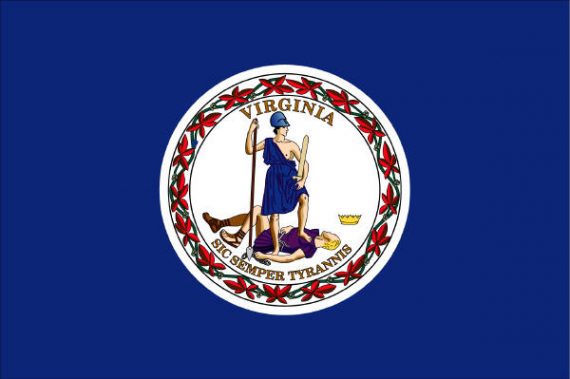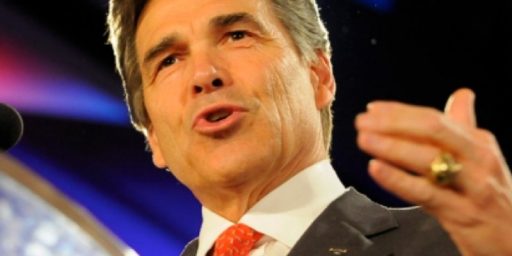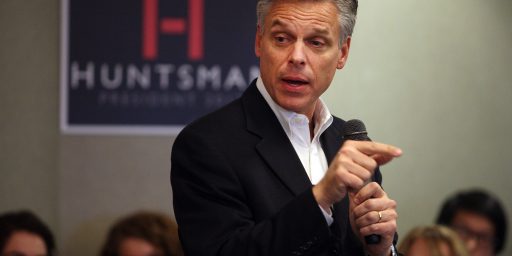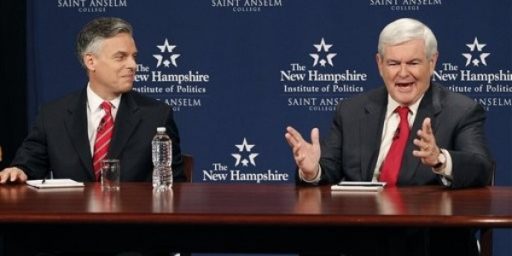Good News For Perry, Gingrich, Huntsman, And Santorum In Virginia? Maybe, Maybe Not
Some legal developments in the lawsuit over access to Virginia's March 6th Primary Ballot.
The blogosphere is abuzz this afternoon with news of a very interesting order issued by the Federal District Court Judge presiding over the lawsuit filed by Rick Perry, to which three other campaigns have joined, regarding exclusion from Virginia’s March 6th Primary Ballot:
A very big development in the ballot access lawsuit filed in federal court in Virginia by Texas Governor Rick Perry and joined by Newt Gingrich, Rich Santorum, and Jon Huntsman. Judge John Gibney just filed afive-page order in which he states that:
There is a strong likelihood that the Court will find the residency requirement for petition circulators to be unconstitutional. The authorities make clear that circulating petitions for candidates is a form of protected speech, and that the Commonwealth has a heavy burden to justify the restriction on speech by showing not only that the limitation achieves a valid state interest but also that the limitation is no broader in scope than necessary to achieve that purpose. As in all strict scrutiny cases, the state has a difficult task to demonstrate the propriety of its limitation on protected speech. For this reason, the Court believes that the plaintiffs have a substantial likelihood of succeeding on the merits, at least on the issue of the validity of the residency requirement.
So we should know by the end of the day on Friday whether Perry, Gingrich, Huntsman and/or Santorum will be added to the ballot or if the only choices for Virginia voters will be Mitt Romney and Ron Paul in the Republican primary on March 6. With this latest order from the judge, it is highly likely that there will be additional candidates on the ballot
Having read the Order, which is embedded below, I’m not entirely certain that it is nearly as breathtaking as some are taking it to be. Essentially, the Court is issuing a Temporary Restraining Order barring the SBOE and local election boards from mailing out absentee and military ballots until the Court has ruled on the matter. The Order itself sets forth the requirements for a TRO under Federal law and in order to explain why the Court is making the ruling and, quite obviously, to justify the decision when it is ruled upon on appeal. One of those criteria is whether the Plaintiffs — the campaigns in this case — have a likelihood of success on the merits. The quoted part of the Order is essentially the Court’s statement regarding the merits of Perry’s case in that regard. If you read through the rest of the Order, you’ll see that Judge Gibney deals with all the other criteria for a TRO. Quite honestly, I don’t find the ruling entirely surprising. The SBOE was scheduled to start mailing ballots today. Had it done so, then the January 13th hearing would have been essentially pointless. In some sense, the Court is simply preserving the status quo ante until it has an opportunity to rule on the merits of the case.
I wouldn’t necessarily consider this good news for Perry, Gingrich, or any of the other campaigns, however. There’s a distinct possibility that Judge Gibney could find that Virginia’s law requiring that petitioners be Virginia residents is unconstitutional (a position at least three Circuit Courts of Appeal have reached about similar laws in recent years) and simultaneously find that he cannot grant the relief that the Plaintiffs are requesting, which is to order the Virginia State Board of Elections to place their names on the March 6th ballot.
Here’s why.
None of these candidates were able to comply with the Virginia law that requires 10,000 valid signatures from registered Virginia voters, including 400 from each Congressional District. Rick Perry admitted in his pleadings that he only submitted 6,000 valid signatures. Newt Gingrich’s campaign has said that they didn’t reach 10,000 signatures because of fraud committed by a paid signature gatherer who defrauded them by forging over 2,000 signatures (Newt submitted 11,050 signatures, so those 2,000 fraudulent signatures put him below the limit). Jon Huntsman and Rick Santorum, meanwhile, didn’t even bother to submit petitions at all. Given these facts, it isn’t at all inconceivable that Judge Gibney could end up deciding that the residency requirement is unconstitutional, but that he is powerless to grant any of the Plaintiffs the relief they request because they failed to comply with the law at all.
Stay tuned.
Here’s the Order:
Order In Perry et al v. Mullins et al
H/T: The Right Sphere







Once again I predict this is going to end with the elections board waiving the signature requirements. These laws are really only intended to make things difficult for third party candidates.
The SBOE does not have the legal authority to do what you predict
Yes, but ther’re whipsawing the law in order to accomplish a cherished private benefit (access for which one did not qualify), and isn’t that what matters to conservatives–activist judges who do what is right (as opposed to left)?
Really want just Mittens and RonPaul on the ballot in Virginny. This would make my life more interesting.
@Doug Mataconis:
Yes, but who has standing to stop them if they do?
Just as an example, in 2008, due to the late conventions, both parties missed the deadline to certify their nominees:
http://www.ballot-access.org/2008/08/27/democrats-republicans-miss-texas-deadline-to-certify-presidential-nominees/
The Texas Secretary of State, completely without legal authority, more of less made up a procedure to get around the deadline.
Similarly, in 2002 when Toricelli dropped out New Jersey ballot deadline, Lautenberg was again able to get on the ballot thanks to the NJ government waiving the rules without authority.
Page 4 of the order is particularly interesting; it appears that the Court is communicating that its ruling is proportionate to the minimal inconvenience of a four day delay and is not to be iterpreted as signalling the ultimate ruling. As Doug writes, if the judge doesn’t give at least enough of a delay to provide the parties an opportunity to file their legal arguments, the court will have failed to maintain the status quo to allow the courts to look at these issues. I would intepret this as the court protecting itself, not Perry et al.
@Stormy Dragon:
The Attorney General of Virginia
@Doug Mataconis:
If the state Republican party decides to ignore the rules to benefit their own candidates, do you really think the Republican attorney general is going to pooch his future run for governor by taking them to court and making a big mess for the party?
@Stormy Dragon:
1. Ken Cucinelli has already filed an appeal with the 4th Circuit seeking to overturn Judge Gibney’s injunction.
2. The RPV didn’t ignore the rules
3. Are you suggesting that Ron Paul is one of the RPV’s “own” candidates?
@Doug Mataconis:
No, which is why I think the rules are going to end up being waived. The guy they really wanted to keep out managed to get in anyways, so there’s no reason to enforce rules that are only hurting establishment candidates.